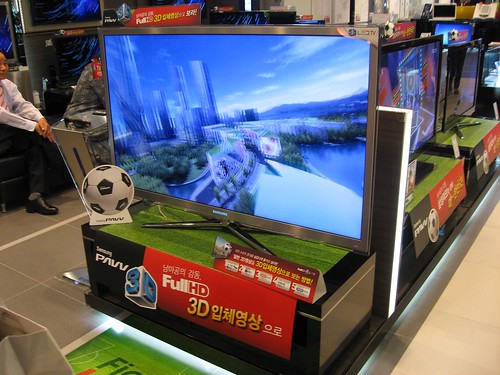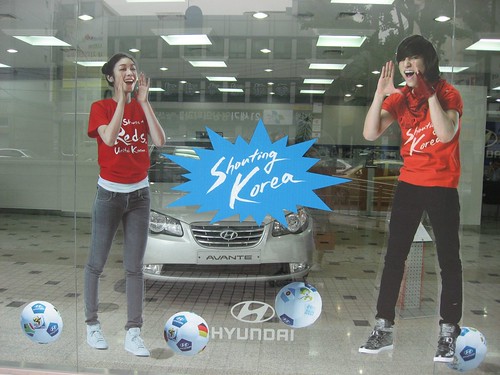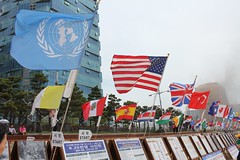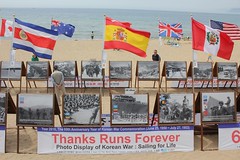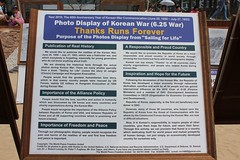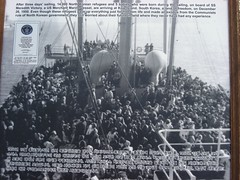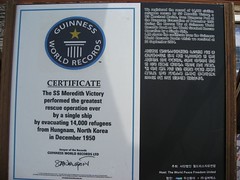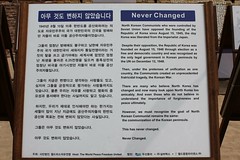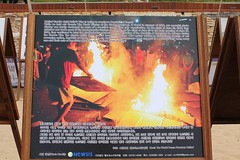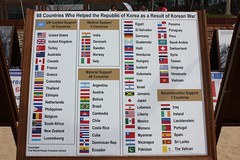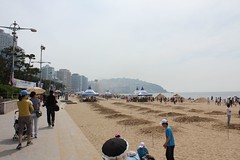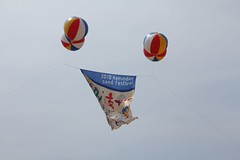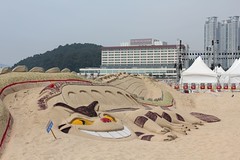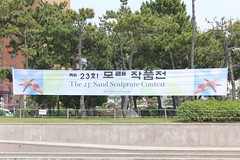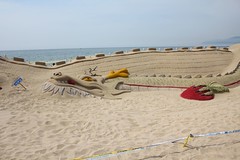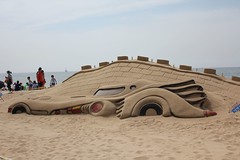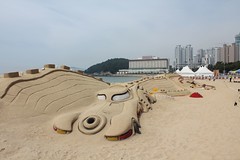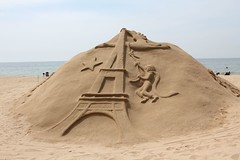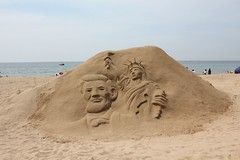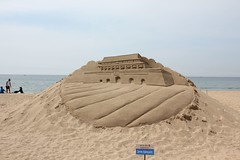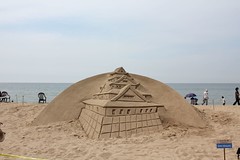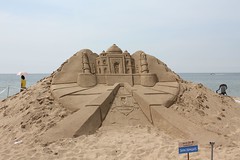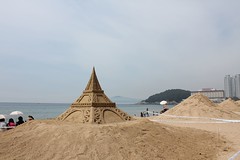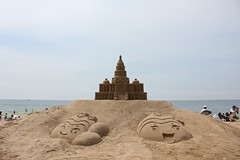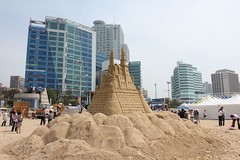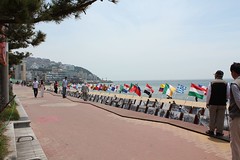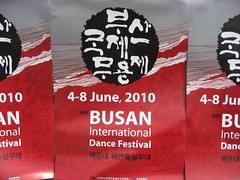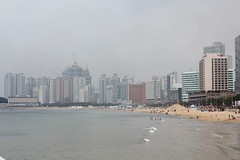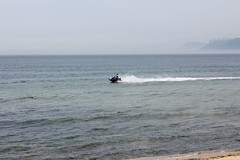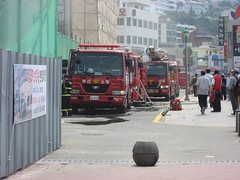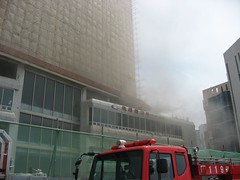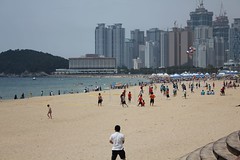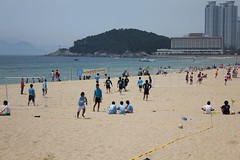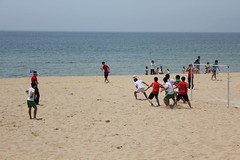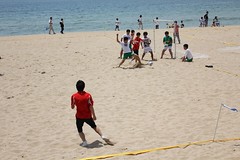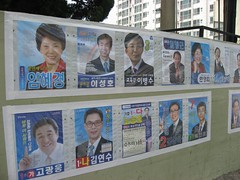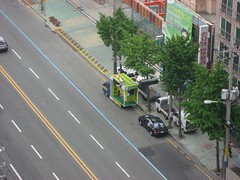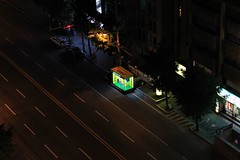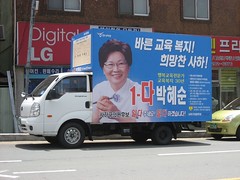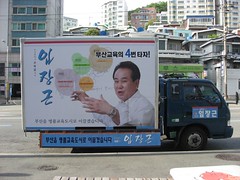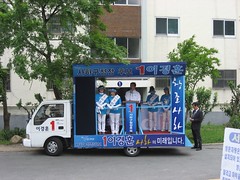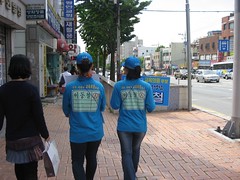Apparently it was the dream of many Korean men to watch the World Cup on a 3D TV. I thought that was a little optimistic but then I found one in Lotte Department Store near us, proving at least that the technology was really out there as opposed to 'coming soon'. However, at around 2.5 million won (£1,400/$2,100), for many it may have remained a dream for now, although Samsung claim to have sold 26,000 3D TVs in Korea, so evidently some had the money to make the leap of faith.
Watching a 3D match live in the cinema seemed much more attainable, but it was so popular we were unable to get tickets. It was remarkable really, considering that at almost any other time football barely seems to register on the Korean sporting radar. I guess that's national pride for you. Despite working full-time during the day, two friends of ours - one of whom never watches football otherwise - arranged their limited sleeping schedule around South Korea's matches and somehow still managed to function at the office the next day.
Perhaps unfortunately for the 3D viewers though, some were quite disappointed by the quality of the 3D coverage. What I saw in the Lotte Department Store through 3D glasses was quite impressive, but it was a demonstration video which I'm sure is optimised to sell televisions. As always, real life may vary from the promises we are sold.
Even 2D television coverage was problematic. SBS won the exclusive rights to broadcast matches in Korea much to the anger of their competitors, but the practical upshot of this seems to have been that when matches occurred simultaneously SBS only showed one, because they were only using one channel to broadcast coverage. Which meant if you happen to be a foreigner wanting to watch your own team, or a Korean with a particular foreign interest, apparently you were out of luck.
The standard line of encouragement to almost anything requiring strenuous effort here is Fighting!, although admittedly due to the linguistic challenge of pronouncing this English word it is often heard as Whiting!, so I hear Korea Fighting! - or Korea Whiting! - rather a lot when the country, or anyone within it, is doing anything remotely competitive. The tag-line for the World Cup though, appeared to be Shouting Korea, or Korea Shouting - a potentially noisy yet welcoming toning down of the rhetoric. When the matches were shown, the highway outside our apartment went eerily quiet - somewhere out there, an entire nation were glued to their 2D and 3D screens.
And now it's over - for Korea at least - and presumably an entire nation will go back to the status quo ante as far as football is concerned until the next major championship. I keep meaning to go to a football game here, but they seem so far off the radar normally that I've never managed it, despite having a friend who is a referee with the Korean Football Association.
Monday, June 28, 2010
Wednesday, June 23, 2010
Not Necessarily the News
The first time I lived in Korea I tried to learn the language and understand the culture I was faced with every day, but I didn't have the time to develop an understanding of some of the wider aspects of society that fills the newspapers every day, and I wasn't expecting to stay. I found this decision made Korea more enjoyable for me, because I didn't have to read about politicians arguing every day, the crimes and wider social problems afflicting the country, or endless celebrity gossip.
The second time I came to Korea, it was with every chance of staying here for much longer, so I knew I had to start trying to understand the country I was living in at a deeper level. I started making the effort to go through the newspapers every day. One of the suspicions about Korea that was confirmed by doing this was the precarious state of online security. My anecdotal experience suggested that most people used pirated versions of Windows, everyone used Internet Explorer (even though it was so troubled other Governments were issuing advisories to people not to use it at all), and ActiveX was the basis of all online banking. Firewalls and anti-virus software were optional, and resident protection systems almost unheard of save for odd anti-virus and anti-keylogging applications which tended to load for the duration of an online banking session. You are often out of luck functioning on the IE-centric Korean web if you choose Firefox, let alone an entirely different platform such as Linux or MacOS.
So I discovered that at least there is a growing debate about the state of online security in the media, with some blame even being attached to the security companies themselves, and the Government is making noises about making changes. It's a potentially important issue, because South Korea may be wide open to a coordinated cyber-assault - there have already been a significant number of isolated attacks, and given the nature of the tensions on the peninsula, an enemy may gain an advantage by disrupting communications in the South immediately prior to a military attack.
But despite the increasing media debate, ironically it appears that sections of the media have fallen victim themselves, by proxy if not directly. Last week Google Chrome started blocking The Korea Herald, followed by national broadcaster, KBS. Later, even Firefox - which is generally more tolerant or ill-informed of such issues, started blocking the Herald website. Since then, access has been sporadic. Could they be false positives? Well, this is what Google's diagnostic page had to say about koreaherald.com:
Of the 1875 pages that we tested on the site over the past 90 days, 81 page(s) resulted in malicious software being downloaded and installed without user consent.
Malicious software includes 99 scripting exploit(s). Successful infection resulted in an average of 4 new process(es) on the target machine.
Which sounds concerning, even if the chances of ending up with four new processes - doing who knows what - on your computer are limited to about 81 in 1875. And the main problem seems to be not the koreaherald.com itself, but code from other domains which koreaherald.com acted as an intermediary for. It may have been advertisers. None of which is any comfort if you fall victim to it, and it truly is malicious.
The second time I came to Korea, it was with every chance of staying here for much longer, so I knew I had to start trying to understand the country I was living in at a deeper level. I started making the effort to go through the newspapers every day. One of the suspicions about Korea that was confirmed by doing this was the precarious state of online security. My anecdotal experience suggested that most people used pirated versions of Windows, everyone used Internet Explorer (even though it was so troubled other Governments were issuing advisories to people not to use it at all), and ActiveX was the basis of all online banking. Firewalls and anti-virus software were optional, and resident protection systems almost unheard of save for odd anti-virus and anti-keylogging applications which tended to load for the duration of an online banking session. You are often out of luck functioning on the IE-centric Korean web if you choose Firefox, let alone an entirely different platform such as Linux or MacOS.
So I discovered that at least there is a growing debate about the state of online security in the media, with some blame even being attached to the security companies themselves, and the Government is making noises about making changes. It's a potentially important issue, because South Korea may be wide open to a coordinated cyber-assault - there have already been a significant number of isolated attacks, and given the nature of the tensions on the peninsula, an enemy may gain an advantage by disrupting communications in the South immediately prior to a military attack.
But despite the increasing media debate, ironically it appears that sections of the media have fallen victim themselves, by proxy if not directly. Last week Google Chrome started blocking The Korea Herald, followed by national broadcaster, KBS. Later, even Firefox - which is generally more tolerant or ill-informed of such issues, started blocking the Herald website. Since then, access has been sporadic. Could they be false positives? Well, this is what Google's diagnostic page had to say about koreaherald.com:
Of the 1875 pages that we tested on the site over the past 90 days, 81 page(s) resulted in malicious software being downloaded and installed without user consent.
Malicious software includes 99 scripting exploit(s). Successful infection resulted in an average of 4 new process(es) on the target machine.
Which sounds concerning, even if the chances of ending up with four new processes - doing who knows what - on your computer are limited to about 81 in 1875. And the main problem seems to be not the koreaherald.com itself, but code from other domains which koreaherald.com acted as an intermediary for. It may have been advertisers. None of which is any comfort if you fall victim to it, and it truly is malicious.
Sunday, June 20, 2010
Fish Out of Water
We never set out to own animals in Korea, but they seem to find us. First we rescued hamsters from a snake. Then we rescued a dog from some people who didn't really know how to care for him, followed by another dog from some traffic - although we managed to find that one's owner. And now, it's fish.
Personal relationships are quite important in Korea, and the social network is often how business will be done. This meant that when I bought into a health insurance plan here, it was only proper that I gave Korean Mother's insurance friend a hearing before running off to sign a deal with some faceless, but potentially more competitive, corporation. We eventually signed the deal with her anyway because we were busy, and didn't have time to wade through the complexities of all the various deals in the wider market.
The line between friendship and business gets blurred like this, meetings can be social with the underlying suspicion of being opportunistic, lunch can be bought, and the vague sense of obligation to return the favour grows bigger with every bill. Then sometimes, your insurance agent gives you an aquarium full of tropical fish with the words "I hope you will bring me some more clients".
To my mind Korean Mother didn't want to have the fish, but didn't want to face the rudeness of rejecting the gift, so they quickly landed in our office. I had mixed feelings about this turn of events - on the one hand I thought it might bring a little island of calmness to our increasingly stress-filled trading floor, but on the other hand it meant I suddenly had to learn all about keeping fish in addition to my DSLR learning curve, Korean studies, trading, baby related work and another sudden political campaign I'd become involved in back in the UK. But herein lies another lesson about language barriers. Korean Mother wanted the fish, but thought I liked them, so decided to give them to us. Had I known that, I would have readily set her straight and said "keep the fish". As it was, this fact only emerged two weeks later, after two of our thirteen fish depressingly died and another one was separated into a box before giving birth to seventeen babies.
So I read all I could about the fish in the limited time I had, and came to the conclusion that they needed some plants - or at least, the smaller ones in our tank did. I researched about plants, and then we went to a fish store, but we came away empty-handed - the woman in the shop just raised more questions than she answered. I could write a long story about everything that happened afterwards but suffice to say that my conclusion was that there are two schools of opinions on fish-related matters - the Internet consensus, comprising of various large hobby and commercial sites, discussion boards and Wikipedia, and the second school of opinion - Korean shop owners - which often appears to disagree with it. What I learned from the Internet was that the pH level of the water was quite important, and what I was told by the shop owners was "oh, you don't want to worry about that sort of thing". And I ended up with some plants - a random fish store selection - not the ones I thought were compatible with our fish. That was another one of those "oh don't worry about it" scenarios.
Another "oh don't worry about it" moments came when Korean Mother was given some more fish, including five babies, by her Insurance Friend, and she insisted on keeping them in a large jar. Now admittedly, the jar was so large that it probably held as much water as our aquarium, but there was no filter, heater or anything else you might think necessary. By this time I'd read about the basic needs of a healthy tropical aquarium, and was growing increasingly frustrated with the fact that I couldn't pursued her through my translator wife that this was not a good idea.
Korean Mother did, at least, change the water regularly, but she'd do all of it and clean the jar, which necessitated transferring all the fish to a much smaller container. Finally, for reasons I just don't understand and the language barrier prevents me from discovering, the large jar would be left to dry for gradually longer periods until one day she showed no inclination to move the fish back at all. "This", I told my wife, "is going to turn into a disaster". I suggested she buy an aquarium - it would be much less work - then I offered to buy her an aquarium with the proper equipment, and when that failed, I insisted on it, but to no avail.
So it had reached the stage where the only way anything was going to get done was by me going down to the fish store on my own, and somehow muddling through buying what Korean Mother needed, despite her considerable resistance. Korean Mother is a Buddhist, and holds all life as sacred, so I really couldn't understand it.
The next day we went out together leaving the fish in the small jar with my final words on the subject being "she's not leaving those fish in that jar is she?" Sure enough, when we returned in the evening, about ten dead fish were floating at the top. The remarkable thing was, that five one centimetre-long baby fish in the jar and an immature guppy had survived, although the latter took two days before it was able to submerge below the water surface again.
Korean Mother's plan to separate the dead fish from the survivors apparently involved pouring the water into the sink on the dubious principle that the latter would stay in the jar. This may or may not have worked but apparently it doesn't work if you pour really fast. She gets flustered sometimes. Following my horrified look, numeric hand gestures and some frantic translation work by my wife, Korean Mother somehow found the two missing baby fish in the unspeakable hole that is used in sinks in this country to collect festering masses of Korean food, and improbably they were returned safely to the water.
Korean Mother decided to buy a proper aquarium. She hadn't wanted to pay the money to buy one before, but once in the store I was not entirely surprised when the 50-inch LCD mentality took over and she chose a tank that was over three times the price of what we have. There's a lot which has frustrated me in connection with the fish - but file this under something positive which would never have happened in my country - the store owner offered to give us a lift back to our apartment with it so he could set it up and have a look at our fish to help us identify a couple of them we'd failed to.
What I took from all this is not about fish but about language. Aside from the fact I ended up with an aquarium I'd have been quite happy not to have, somehow, the fact that I can't effectively communicate in Korean makes it feel to me that I'm really not getting my point across sometimes. Perhaps it means I'm easier to ignore. I guess I play that game too. Touché.
And as for the story of those fish stores versus the Internet though, I have reached the conclusion that I'm going to side with the Internet; Korean Mother was at one of those shops recently to stock her aquarium, and when I looked more closely at their tanks, I saw they were full of dead fish, and they'd clearly been dead for some time. What's more, it wasn't long before some of the fish be bought started suffering from fin rot, and once again the treatment advice differed significantly from the Internet consensus. Something has to be done because it's not something I want to see; watching them slowly waste away while being constantly pecked at by the other fish can be uncomfortably reminiscent of life as a foreigner in Korea.
Personal relationships are quite important in Korea, and the social network is often how business will be done. This meant that when I bought into a health insurance plan here, it was only proper that I gave Korean Mother's insurance friend a hearing before running off to sign a deal with some faceless, but potentially more competitive, corporation. We eventually signed the deal with her anyway because we were busy, and didn't have time to wade through the complexities of all the various deals in the wider market.
The line between friendship and business gets blurred like this, meetings can be social with the underlying suspicion of being opportunistic, lunch can be bought, and the vague sense of obligation to return the favour grows bigger with every bill. Then sometimes, your insurance agent gives you an aquarium full of tropical fish with the words "I hope you will bring me some more clients".
To my mind Korean Mother didn't want to have the fish, but didn't want to face the rudeness of rejecting the gift, so they quickly landed in our office. I had mixed feelings about this turn of events - on the one hand I thought it might bring a little island of calmness to our increasingly stress-filled trading floor, but on the other hand it meant I suddenly had to learn all about keeping fish in addition to my DSLR learning curve, Korean studies, trading, baby related work and another sudden political campaign I'd become involved in back in the UK. But herein lies another lesson about language barriers. Korean Mother wanted the fish, but thought I liked them, so decided to give them to us. Had I known that, I would have readily set her straight and said "keep the fish". As it was, this fact only emerged two weeks later, after two of our thirteen fish depressingly died and another one was separated into a box before giving birth to seventeen babies.
So I read all I could about the fish in the limited time I had, and came to the conclusion that they needed some plants - or at least, the smaller ones in our tank did. I researched about plants, and then we went to a fish store, but we came away empty-handed - the woman in the shop just raised more questions than she answered. I could write a long story about everything that happened afterwards but suffice to say that my conclusion was that there are two schools of opinions on fish-related matters - the Internet consensus, comprising of various large hobby and commercial sites, discussion boards and Wikipedia, and the second school of opinion - Korean shop owners - which often appears to disagree with it. What I learned from the Internet was that the pH level of the water was quite important, and what I was told by the shop owners was "oh, you don't want to worry about that sort of thing". And I ended up with some plants - a random fish store selection - not the ones I thought were compatible with our fish. That was another one of those "oh don't worry about it" scenarios.
Another "oh don't worry about it" moments came when Korean Mother was given some more fish, including five babies, by her Insurance Friend, and she insisted on keeping them in a large jar. Now admittedly, the jar was so large that it probably held as much water as our aquarium, but there was no filter, heater or anything else you might think necessary. By this time I'd read about the basic needs of a healthy tropical aquarium, and was growing increasingly frustrated with the fact that I couldn't pursued her through my translator wife that this was not a good idea.
Korean Mother did, at least, change the water regularly, but she'd do all of it and clean the jar, which necessitated transferring all the fish to a much smaller container. Finally, for reasons I just don't understand and the language barrier prevents me from discovering, the large jar would be left to dry for gradually longer periods until one day she showed no inclination to move the fish back at all. "This", I told my wife, "is going to turn into a disaster". I suggested she buy an aquarium - it would be much less work - then I offered to buy her an aquarium with the proper equipment, and when that failed, I insisted on it, but to no avail.
So it had reached the stage where the only way anything was going to get done was by me going down to the fish store on my own, and somehow muddling through buying what Korean Mother needed, despite her considerable resistance. Korean Mother is a Buddhist, and holds all life as sacred, so I really couldn't understand it.
The next day we went out together leaving the fish in the small jar with my final words on the subject being "she's not leaving those fish in that jar is she?" Sure enough, when we returned in the evening, about ten dead fish were floating at the top. The remarkable thing was, that five one centimetre-long baby fish in the jar and an immature guppy had survived, although the latter took two days before it was able to submerge below the water surface again.
Korean Mother's plan to separate the dead fish from the survivors apparently involved pouring the water into the sink on the dubious principle that the latter would stay in the jar. This may or may not have worked but apparently it doesn't work if you pour really fast. She gets flustered sometimes. Following my horrified look, numeric hand gestures and some frantic translation work by my wife, Korean Mother somehow found the two missing baby fish in the unspeakable hole that is used in sinks in this country to collect festering masses of Korean food, and improbably they were returned safely to the water.
Korean Mother decided to buy a proper aquarium. She hadn't wanted to pay the money to buy one before, but once in the store I was not entirely surprised when the 50-inch LCD mentality took over and she chose a tank that was over three times the price of what we have. There's a lot which has frustrated me in connection with the fish - but file this under something positive which would never have happened in my country - the store owner offered to give us a lift back to our apartment with it so he could set it up and have a look at our fish to help us identify a couple of them we'd failed to.
What I took from all this is not about fish but about language. Aside from the fact I ended up with an aquarium I'd have been quite happy not to have, somehow, the fact that I can't effectively communicate in Korean makes it feel to me that I'm really not getting my point across sometimes. Perhaps it means I'm easier to ignore. I guess I play that game too. Touché.
And as for the story of those fish stores versus the Internet though, I have reached the conclusion that I'm going to side with the Internet; Korean Mother was at one of those shops recently to stock her aquarium, and when I looked more closely at their tanks, I saw they were full of dead fish, and they'd clearly been dead for some time. What's more, it wasn't long before some of the fish be bought started suffering from fin rot, and once again the treatment advice differed significantly from the Internet consensus. Something has to be done because it's not something I want to see; watching them slowly waste away while being constantly pecked at by the other fish can be uncomfortably reminiscent of life as a foreigner in Korea.
Thursday, June 17, 2010
Shooters
Many people in Korea seems to be walking around with DSLR cameras, even 18-year old looking girls who don't exactly strike me as the most obvious target consumer. Expensive photographic equipment is stuffed in handbags or carried casually around the neck with little protection. Occasionally, even the lens caps are alarmingly optional.
I'd never buy a DSLR back in England, where my home town was ranked as the second most dangerous city in the country the year I first left it for Korea, which is a little safer than that. And if everyone is carrying around expensive gadgets here - and they do - there's an element of safety in numbers. After arriving in Korea, it didn't take me long to establish the limits of my Canon IXUS 800 (aka Powershot SD700), and I thought about buying a DSLR but never reached the point where I believed it was worth it. I regarded myself as more of a point-and-shoot person, and that suited the rough and tumble of my Korean life. With a baby on the way things changed because my wife and I want to take higher quality shots than my old 6 megapixel IXUS allows. The videos will be higher quality as well, but whether it's an acceptable if compromised alternative to a proper camcorder remains to be seen.
It's that rough and tumble that minded me to buy a Canon DSLR. I don't write about all my experiences in Korea for various reasons including lack of time, privacy and apathy, but a couple of years ago my IXUS went on holiday to Jeju Island without me and got dropped on a concrete floor. The upshot of that was finding that Canon had an official repair centre above their store in the Nampodong district of Busan, which meant that I managed to get my shattered compact repaired. It meant that it got stuck in my mind that the after-sales service for a DSLR Canon was going to be a lot easier than for a Nikon.
I'd also read that one of the DSLR cameras I'd been looking at – I'm afraid I can't remember which one now but - didn't have an English language option if bought in Korea. They probably do this sort of thing to prevent grey imports into other countries. Unfortunately, it meant that this camera was quickly struck off my list. I happen to use a Korean version of Windows which to the surprise of the retailer I insisted on buying with my computer (sometimes I think it might be the only legal copy of Korean Windows in the entire country), but I drew the line on living with a Korean-menu-only DSLR I might not even understand in English.
So I went to the Canon store in Nampodong recently to look at the Canon EOS 550D (which is confusingly called the Rebel T2i in the US). While there a young couple walked in, weren't quite sure what they wanted, were shown a 550D, and decided to buy it – just like that. I was still doing a lot of research. But it seemed like a very familiar attitude here, where gadgets are so ubiquitous they are treated almost like commodities.
When it came time for me to buy, I didn't really want to pay Canon's official prices, so I humoured myself looking at the prices on Korean Internet sites. But whereas back in the UK there are online retailers - and then there is the Wild West of distrust that is eBay - in Korea it's common to buy from sellers you've never heard of via sites like Auction and Gmarket, which to put it into context would be like buying everything through eBay back home. I'm not really comfortable with buying expensive electrical equipment from auction sites, but on the whole people in Korea don't seem quite as reticent. We eventually bought from the large electrical chain Hi-Mart, where we got a free Canon bag but where further attempts to haggle would prove fruitless on the grounds that there was apparently huge demand for the 550D and nobody seemed to have any stock. They certainly didn't need to discount when stock came in. The price was about £680 ($986/1,200,000 won) with the EF-S 18-55mm lens kit, bag, extra SD card, predictably useless UV filter and a few other bits and pieces. And we'd still have to wait - two to three weeks.
When we'd done the deal the assistant didn't seem enthusiastic – my wife jokingly asked him why – shouldn't he be happy with the commission? He said he wasn't because he couldn't give us the product immediately – and I believe he really meant it.
It took three weeks in the end to come, and when they got it they still didn't have a bag, so – unprompted - they gave us a new 'Samsung VLUU' bag to use in the interim. I didn't use it but suspiciously held it hostage until the Canon one arrived.
Three CDs came in the box. The first contained the accompanying software, the second, which contained manuals for the accompanying software was entitled the 'Software Instruction Manual', and the third carried the Korean description '소프트웨어 사용설명서' which approximately translates as the 'Software usage instructions' – in other words, it contained manuals for the accompanying software and sure enough the contents were exactly the same as the second CD, with instructions for the software in English, French, Japanese, Russian, Simplified Chinese and Spanish. Which meant that neither CD had Korean instructions for the accompanying software, despite one of them being given a Korean title. It looks like Canon made a mistake somewhere there.
But for all my research, while the camera can be switched into one of 25 languages including English and Korean, to my surprise there was no PDF manual on the CDs in the box, but instead a 206 page printed Korean manual which was useless to me. Fortunately it wasn't an issue since I'd downloaded the English manual a few weeks beforehand in order to do some final research. It's just as well it's readily available.
After I'd got the camera I went back over to Nampodong to have a look at filters and lens hoods, and discovered three new large camera shops in close proximity to Canon's store. That's the odd thing about Korea - shops in the same line of business have a tendency to cluster. Perhaps Nampodong is turning into Busan's camera district.
I'd never buy a DSLR back in England, where my home town was ranked as the second most dangerous city in the country the year I first left it for Korea, which is a little safer than that. And if everyone is carrying around expensive gadgets here - and they do - there's an element of safety in numbers. After arriving in Korea, it didn't take me long to establish the limits of my Canon IXUS 800 (aka Powershot SD700), and I thought about buying a DSLR but never reached the point where I believed it was worth it. I regarded myself as more of a point-and-shoot person, and that suited the rough and tumble of my Korean life. With a baby on the way things changed because my wife and I want to take higher quality shots than my old 6 megapixel IXUS allows. The videos will be higher quality as well, but whether it's an acceptable if compromised alternative to a proper camcorder remains to be seen.
It's that rough and tumble that minded me to buy a Canon DSLR. I don't write about all my experiences in Korea for various reasons including lack of time, privacy and apathy, but a couple of years ago my IXUS went on holiday to Jeju Island without me and got dropped on a concrete floor. The upshot of that was finding that Canon had an official repair centre above their store in the Nampodong district of Busan, which meant that I managed to get my shattered compact repaired. It meant that it got stuck in my mind that the after-sales service for a DSLR Canon was going to be a lot easier than for a Nikon.
I'd also read that one of the DSLR cameras I'd been looking at – I'm afraid I can't remember which one now but - didn't have an English language option if bought in Korea. They probably do this sort of thing to prevent grey imports into other countries. Unfortunately, it meant that this camera was quickly struck off my list. I happen to use a Korean version of Windows which to the surprise of the retailer I insisted on buying with my computer (sometimes I think it might be the only legal copy of Korean Windows in the entire country), but I drew the line on living with a Korean-menu-only DSLR I might not even understand in English.
So I went to the Canon store in Nampodong recently to look at the Canon EOS 550D (which is confusingly called the Rebel T2i in the US). While there a young couple walked in, weren't quite sure what they wanted, were shown a 550D, and decided to buy it – just like that. I was still doing a lot of research. But it seemed like a very familiar attitude here, where gadgets are so ubiquitous they are treated almost like commodities.
When it came time for me to buy, I didn't really want to pay Canon's official prices, so I humoured myself looking at the prices on Korean Internet sites. But whereas back in the UK there are online retailers - and then there is the Wild West of distrust that is eBay - in Korea it's common to buy from sellers you've never heard of via sites like Auction and Gmarket, which to put it into context would be like buying everything through eBay back home. I'm not really comfortable with buying expensive electrical equipment from auction sites, but on the whole people in Korea don't seem quite as reticent. We eventually bought from the large electrical chain Hi-Mart, where we got a free Canon bag but where further attempts to haggle would prove fruitless on the grounds that there was apparently huge demand for the 550D and nobody seemed to have any stock. They certainly didn't need to discount when stock came in. The price was about £680 ($986/1,200,000 won) with the EF-S 18-55mm lens kit, bag, extra SD card, predictably useless UV filter and a few other bits and pieces. And we'd still have to wait - two to three weeks.
When we'd done the deal the assistant didn't seem enthusiastic – my wife jokingly asked him why – shouldn't he be happy with the commission? He said he wasn't because he couldn't give us the product immediately – and I believe he really meant it.
It took three weeks in the end to come, and when they got it they still didn't have a bag, so – unprompted - they gave us a new 'Samsung VLUU' bag to use in the interim. I didn't use it but suspiciously held it hostage until the Canon one arrived.
Three CDs came in the box. The first contained the accompanying software, the second, which contained manuals for the accompanying software was entitled the 'Software Instruction Manual', and the third carried the Korean description '소프트웨어 사용설명서' which approximately translates as the 'Software usage instructions' – in other words, it contained manuals for the accompanying software and sure enough the contents were exactly the same as the second CD, with instructions for the software in English, French, Japanese, Russian, Simplified Chinese and Spanish. Which meant that neither CD had Korean instructions for the accompanying software, despite one of them being given a Korean title. It looks like Canon made a mistake somewhere there.
But for all my research, while the camera can be switched into one of 25 languages including English and Korean, to my surprise there was no PDF manual on the CDs in the box, but instead a 206 page printed Korean manual which was useless to me. Fortunately it wasn't an issue since I'd downloaded the English manual a few weeks beforehand in order to do some final research. It's just as well it's readily available.
After I'd got the camera I went back over to Nampodong to have a look at filters and lens hoods, and discovered three new large camera shops in close proximity to Canon's store. That's the odd thing about Korea - shops in the same line of business have a tendency to cluster. Perhaps Nampodong is turning into Busan's camera district.
Tags:
culture,
shopping,
technology
Monday, June 14, 2010
The Face of the Enemy
If we sit by and become complacent and put our heads in the sand, we're complicit. - Shelley Morrison
Last Sunday was a public holiday here. Memorial Day, held on the 6th June each year, commemorates those who have died for what has become the Republic of Korea.
I was on a beach, it was hot and smoke blew overhead from a burning building, but the acrid smell which reached me didn't drive me back; amongst grotesque images of death and destruction I saw tanks and they were friendly. A British flag flapped in the wind. The pristine sands of Haeundae were hosting a Korean War memorial.
Under the title of "Thanks Runs Forever" (except, perhaps, if you're a member of this group), "The World Peace Freedom United" explains:
We would like to publicize the realities of the Korean War... ...which was a fratricidal war, and which everybody is forgetting, especially for young generation who do not know anything about truth.
This may be a fair point - a Gallup poll conducted in Korea suggests that only 43.9% of young people polled identified North Korea as being responsible for the war. 10.9% blamed the United States. While this is contrary to accepted history, it cuts both ways. The memorial describes the 1948 Republic of Korea as 'a free, liberal and democratic country', a narrative which does not necessarily fit well with the Jeju Uprising during which mass executions of suspected leftists took place, or the findings of South Korea's Truth and Reconciliation Commission pertaining to the 1948-1950 period.
People like to label themselves liberals or conservatives, but when they do so they give up their individual rationality in favour of outsourcing their thinking to a newspaper, television network, political group or political leader, and this country has its fair share of useful idiots in this respect. But unless you believe the North Korean propaganda machine (as some in the South are apparently minded to), most of the facts are not in question. Stories like those of the SS Meridith Victory are often no more than historical footnotes, and yet they are profoundly important touchstones in the context of their times.
"North Korean refugees just trusted United Nations Forces and followed them to go the world of freedom, Republic of Korea."
Coming down 'Hwangcho-Ryung' Pass on December 10, 1950, the column of US 1st Marine Corps and a Provisional Battalion of 31st Regiment of US Army 7th Infantry Division, which were composed with survivors, were intermixed with many North Korean refugees feeling from the Chinese Communist Forces to go the land of freedom and life, Republic of Korea.
Some civilians were not so fortunate, and the memorial did not hesitate to show those images too. Below the photo of a dead American soldier with a gaping head wound and minus a leg, we are informed:
Body of soldier killed from 3rd Battalion, 31st Regiment of US 7th Infantry Division. Why this young fellow die? He sacrificed himself for freedom and democracy for Korea and Korean people.
But the memorial is not just about the past, but the present and the future. We are told that North Korea has never changed:
"North Korean Communists who were controlled by Soviet Union have opposed the founding of the Republic of Korea since August 15, 1945, the day Korea was liberated from the Imperialist Japan.
Despite their opposition, the Repubic of Korea was founded on August 15, 1948 through election as a free and democratic country.
Then, under the pretenses of unification as one county, the Communists created an unprecendented fatricidal tragedy, the Korean War.
There are many who believe North Korea has changed and now many look upon North Korea too amicably.
However, we must recognize the goal of North Korean Communist remains the same: the communization of the Korean peninsula. This has never changed. Never changed."
So who are these people that would so readily forget the 'lessons of the past' and 'the realities of the present'? Apparently, it's the people who burned the contents of the first memorial when in was on display by Cheonggye Stream in 2008.
"Behind Candle Light Rally?: Who is trying to overthrow Republic of Korea?
While we held our Korean War Photo Display at the Cheonggyecheon of Seoul in summer of 2008, our peaceful photo display was totally destroyed by some of a so-called candle light rally organization. On the night of June 25, 2008, they attacked and broke most of the photographic displays and again, on the night of June 26 to the early morning of June 27, 2008, they continued to burn the photographic memories of the founding of the Republic of Korea and its defense during the Korean War. The photos which these radical terrorists attacked were mainly related to the national identity of our sovereign nation, Republic of Korea. Who can say that these demonstrators were engaged in a peaceful rally when every one saw their acts of terrorism attacking our peaceful photo display?"
Two years later, there are now images of the sinking of South Korea's navy ship Cheonan to add to the display, and the opportunity was not missed. It was an image heavy with symbolism when I saw it, because the memorial made frequent reference to the "Chinese Communist Forces" that ultimately fought against the armies gathered under a United Nations flag in Korea, and to many people's minds by refusing to condemn North Korea's sinking of the Cheonan, they are siding with the aggressor again. There was a board at one end of the memorial with a large sheet of paper and a pen, where people left their thoughts. Two people wrote in badly formed English letters, which made it highly likely that they were not native speakers, 'Chinese Fockers', or something very similar.
Ultimately though, despite China's considerable contribution to the Korean War, the memorial is really about Korea. And personally, I came away from it with a heightened sense of the darker forces which are at work with the Korean Republic - old schisms forged in blood which would rewrite history, and perhaps even re-enact it, given the right circumstances. It's said that those who do not learn the lessons of history are destined to repeat it, and it's easy to forget those lessons on a bright summer's day on a beach where people are playing games and children's laughter is carried through the air. Yet it's that very banality - immediately beyond the images of horror, that perhaps more than anything is the real memorial to those who made the ultimate sacrifice in the name of the free and democratic country which South Korea finally became in 1987.
Last Sunday was a public holiday here. Memorial Day, held on the 6th June each year, commemorates those who have died for what has become the Republic of Korea.
I was on a beach, it was hot and smoke blew overhead from a burning building, but the acrid smell which reached me didn't drive me back; amongst grotesque images of death and destruction I saw tanks and they were friendly. A British flag flapped in the wind. The pristine sands of Haeundae were hosting a Korean War memorial.
Under the title of "Thanks Runs Forever" (except, perhaps, if you're a member of this group), "The World Peace Freedom United" explains:
We would like to publicize the realities of the Korean War... ...which was a fratricidal war, and which everybody is forgetting, especially for young generation who do not know anything about truth.
This may be a fair point - a Gallup poll conducted in Korea suggests that only 43.9% of young people polled identified North Korea as being responsible for the war. 10.9% blamed the United States. While this is contrary to accepted history, it cuts both ways. The memorial describes the 1948 Republic of Korea as 'a free, liberal and democratic country', a narrative which does not necessarily fit well with the Jeju Uprising during which mass executions of suspected leftists took place, or the findings of South Korea's Truth and Reconciliation Commission pertaining to the 1948-1950 period.
People like to label themselves liberals or conservatives, but when they do so they give up their individual rationality in favour of outsourcing their thinking to a newspaper, television network, political group or political leader, and this country has its fair share of useful idiots in this respect. But unless you believe the North Korean propaganda machine (as some in the South are apparently minded to), most of the facts are not in question. Stories like those of the SS Meridith Victory are often no more than historical footnotes, and yet they are profoundly important touchstones in the context of their times.
"North Korean refugees just trusted United Nations Forces and followed them to go the world of freedom, Republic of Korea."
Coming down 'Hwangcho-Ryung' Pass on December 10, 1950, the column of US 1st Marine Corps and a Provisional Battalion of 31st Regiment of US Army 7th Infantry Division, which were composed with survivors, were intermixed with many North Korean refugees feeling from the Chinese Communist Forces to go the land of freedom and life, Republic of Korea.
Some civilians were not so fortunate, and the memorial did not hesitate to show those images too. Below the photo of a dead American soldier with a gaping head wound and minus a leg, we are informed:
Body of soldier killed from 3rd Battalion, 31st Regiment of US 7th Infantry Division. Why this young fellow die? He sacrificed himself for freedom and democracy for Korea and Korean people.
But the memorial is not just about the past, but the present and the future. We are told that North Korea has never changed:
"North Korean Communists who were controlled by Soviet Union have opposed the founding of the Republic of Korea since August 15, 1945, the day Korea was liberated from the Imperialist Japan.
Despite their opposition, the Repubic of Korea was founded on August 15, 1948 through election as a free and democratic country.
Then, under the pretenses of unification as one county, the Communists created an unprecendented fatricidal tragedy, the Korean War.
There are many who believe North Korea has changed and now many look upon North Korea too amicably.
However, we must recognize the goal of North Korean Communist remains the same: the communization of the Korean peninsula. This has never changed. Never changed."
So who are these people that would so readily forget the 'lessons of the past' and 'the realities of the present'? Apparently, it's the people who burned the contents of the first memorial when in was on display by Cheonggye Stream in 2008.
"Behind Candle Light Rally?: Who is trying to overthrow Republic of Korea?
While we held our Korean War Photo Display at the Cheonggyecheon of Seoul in summer of 2008, our peaceful photo display was totally destroyed by some of a so-called candle light rally organization. On the night of June 25, 2008, they attacked and broke most of the photographic displays and again, on the night of June 26 to the early morning of June 27, 2008, they continued to burn the photographic memories of the founding of the Republic of Korea and its defense during the Korean War. The photos which these radical terrorists attacked were mainly related to the national identity of our sovereign nation, Republic of Korea. Who can say that these demonstrators were engaged in a peaceful rally when every one saw their acts of terrorism attacking our peaceful photo display?"
Two years later, there are now images of the sinking of South Korea's navy ship Cheonan to add to the display, and the opportunity was not missed. It was an image heavy with symbolism when I saw it, because the memorial made frequent reference to the "Chinese Communist Forces" that ultimately fought against the armies gathered under a United Nations flag in Korea, and to many people's minds by refusing to condemn North Korea's sinking of the Cheonan, they are siding with the aggressor again. There was a board at one end of the memorial with a large sheet of paper and a pen, where people left their thoughts. Two people wrote in badly formed English letters, which made it highly likely that they were not native speakers, 'Chinese Fockers', or something very similar.
Ultimately though, despite China's considerable contribution to the Korean War, the memorial is really about Korea. And personally, I came away from it with a heightened sense of the darker forces which are at work with the Korean Republic - old schisms forged in blood which would rewrite history, and perhaps even re-enact it, given the right circumstances. It's said that those who do not learn the lessons of history are destined to repeat it, and it's easy to forget those lessons on a bright summer's day on a beach where people are playing games and children's laughter is carried through the air. Yet it's that very banality - immediately beyond the images of horror, that perhaps more than anything is the real memorial to those who made the ultimate sacrifice in the name of the free and democratic country which South Korea finally became in 1987.
Tags:
education,
events,
foreigners,
history,
politics
Monday, June 07, 2010
The Sandman
When I discovered that finance ministers and central bankers from the G-20 were meeting in Busan I felt like I wanted to go and stand outside the hotel to watch because suddenly, as a financial trader, my world was coming to me - here in the relative backwater that is Korea's second city, and I wondered if I would ever again be in the presence of so much collective inaction. But as events transpired, by the time they reached Busan, all I wanted to do was catch a glimpse of the British Chancellor of the Exchequer and shout “Stop letting President Obama kick sand in our faces, Mr. Osborne!” (a long story of Brit-bashing and appalling double standards, especially considering how Britain dealt with Piper Alpha).
But when we reached The Westin Chosun Hotel where the G-20 meeting was being held, it was by a complete coincidence. We'd decided some time ago to attend the Haeundae 'Sand Festival' not realising its proximity to the meeting either on the calendar or geographically. Perhaps unsurprisingly, I didn't get to see my country's finance minister while walking past a stationary policeman every three meters on wooded path near the Hotel. As much as I would have loved to take a photo of the scene, that would most likely result in arrest in my country these days, and while twenty-three years after the end of military government Korea's normal policing style could best be described as 'apologetic', I wasn't going to push my luck.
My wife expressed a casual hope that the North Koreans wouldn't decide to attack Haeundae Beach while we were there. That's the thing about our northern neighbour - you have to think of the most reckless thing they could possibly do, and assume that sooner or later, they'll try it. It didn't seem quite such an absurd idea five minutes later when the sirens went off and I was treated to the sight of lots of Koreans all looking at each other in confusion. The first people I looked at were the police - who appeared completely unconcerned as usual. I suppose it must be normal. We don't get to Haeundae Beach very often - the poor part of town is too far away.
What wasn't quite as normal was the building that was evidently on fire at the far end of the beach, spewing somewhat unpleasant smoke down towards us from time to time. It probably wasn't quite the image the Korean authorities wanted to their international guests with their grandstand view in the hotel.
I did eventually find a smiling fat-cat, but not from The Westin Chosun - it was a sand-sculpture.
We may have arrived at the beach too early in the day. There weren't huge numbers of sculptures - a number were by the same Dutch artist, Jeroen Advocaat, and although a competition with around twenty amateur entrants seemed to be slowly getting under way it was clearly going to take some time to come to fruition. A dance contest was nowhere near beginning and further down the beach a sand-surfing ramp and football pitches were similarly lacking in activity. What I did find was a rather fascinating memorial to the Korean War - but more on this later.
I reached the end of the beach and the building which was belching smoke. It was not entirely surprising to find that it was having some construction work done - it often seems to be the way.
Unfortunately shortly after taking these shots I saw a casualty being loaded into an ambulance, escalating it from another one of those all-too-common unattended under-construction fires to something more serious.
By the time I was half-way back the football had started, but that was about the only development. Much like the G-20 finance ministers over the last two years, I guess our timing was a little off.
But when we reached The Westin Chosun Hotel where the G-20 meeting was being held, it was by a complete coincidence. We'd decided some time ago to attend the Haeundae 'Sand Festival' not realising its proximity to the meeting either on the calendar or geographically. Perhaps unsurprisingly, I didn't get to see my country's finance minister while walking past a stationary policeman every three meters on wooded path near the Hotel. As much as I would have loved to take a photo of the scene, that would most likely result in arrest in my country these days, and while twenty-three years after the end of military government Korea's normal policing style could best be described as 'apologetic', I wasn't going to push my luck.
My wife expressed a casual hope that the North Koreans wouldn't decide to attack Haeundae Beach while we were there. That's the thing about our northern neighbour - you have to think of the most reckless thing they could possibly do, and assume that sooner or later, they'll try it. It didn't seem quite such an absurd idea five minutes later when the sirens went off and I was treated to the sight of lots of Koreans all looking at each other in confusion. The first people I looked at were the police - who appeared completely unconcerned as usual. I suppose it must be normal. We don't get to Haeundae Beach very often - the poor part of town is too far away.
What wasn't quite as normal was the building that was evidently on fire at the far end of the beach, spewing somewhat unpleasant smoke down towards us from time to time. It probably wasn't quite the image the Korean authorities wanted to their international guests with their grandstand view in the hotel.
I did eventually find a smiling fat-cat, but not from The Westin Chosun - it was a sand-sculpture.
We may have arrived at the beach too early in the day. There weren't huge numbers of sculptures - a number were by the same Dutch artist, Jeroen Advocaat, and although a competition with around twenty amateur entrants seemed to be slowly getting under way it was clearly going to take some time to come to fruition. A dance contest was nowhere near beginning and further down the beach a sand-surfing ramp and football pitches were similarly lacking in activity. What I did find was a rather fascinating memorial to the Korean War - but more on this later.
I reached the end of the beach and the building which was belching smoke. It was not entirely surprising to find that it was having some construction work done - it often seems to be the way.
Unfortunately shortly after taking these shots I saw a casualty being loaded into an ambulance, escalating it from another one of those all-too-common unattended under-construction fires to something more serious.
By the time I was half-way back the football had started, but that was about the only development. Much like the G-20 finance ministers over the last two years, I guess our timing was a little off.
Saturday, June 05, 2010
Primary Colors
"The test of democracy is freedom of criticism." - David Ben-Gurion
Elections were held this week in Korea, and while democracy is a great thing, I'm glad to see the back of the campaign for one reason alone. I work until 1am and I don't always get to bed until 2am. So I haven't appreciated the election candidates who seem to think it helps their cause to drive up and down or park outside my apartment building at 7.30am in the morning with loudspeakers featuring vacuous patriotic tunes on a two to three bar loop, or speeches from candidates delivered so emotionally one wonders if they are actually pleading for their lives.
Personally, it mystifies me as to how shouting hysterically at passers-by or playing loud annoying music would, in any way, persuade me to vote for a candidate in this country, because it seems to me it would specifically provoke me into not voting for them. Evidently I'm not the only one who is thoroughly fed up with the candidates' antics. Perhaps they are making so much noise to hide the fact that they don't have many policies - well, except for promising people free WiFi.
Annoyingly, recorded speeches are only allowed from 8am, so those candidates who have been waking me up before this are breaking the law and supposedly run the risk of prison terms of up to two years. That's the theory anyway.
My wife floated the idea of actually complaining to the police, but I didn't think trying to get a candidate jailed was exactly the kind of introduction to Korean politics I wished to have as a foreigner. Foreigners are allowed to vote – if they've been resident long enough which I haven't – but they are 'prohibited from engaging in campaigning', which seems like something of a paradox.
So the streets then are thick with Korea's ubiquitous Bongo trucks converted for political campaigning, coupled with large numbers of election campaigners which makes you marvel at the spirit of campaign volunteerism in this country... until you realise it's actually a popular form of paid part-time employment. Two trucks were almost parked in close proximity to my apartment building on a near permanent basis, which was not a lot of fun after the first couple of days.
I chanced upon an election bongo parked outside an apartment block in a relatively quiet backwater of our neighbourhood. There was nobody to be seen, but it didn't stop the candidate delivering an impassioned speech at full volume to... well, just me actually.
But this is how it's done, and it's sometimes such an efficient system that they don't even bother taking the candidate off the bongo before moving on to the next location. Yes, I've seen candidates bravely hanging on to their lecterns with their token supporters behind them while the vehicle they are standing on has driven down the bumpy highway outside our apartment at around 40mph. It's all rather absurd, but with bribery and vote-buying possibly down in this election (depending on who you believe) – this appears to be one of the best ways candidates can think up to engage people, although one suspects if this is indeed the best idea they have, they probably won't make very good politicians.
I shouldn't complain too much about the noise though, because at least there are elections, even if noise seems to be the main outcome rather than serious debate. And the candidates can't necessarily be completely blamed for the low-tech and apparently policy free approach, since the National Election Commission curiously banned political parties from engaging in public debates over 'hot election issues' (aka Government policies), in a move which seems straight out of the Hugo Chavez playbook. So candidates have numbers, colours and perceived political positions they're not necessarily at liberty to discuss in public. What can people vote for, and how can politicians differentiate themselves in this kind of environment?
There has been innovation though. Twitter is a rapidly growing phenomenon in Korea. and some candidates have used Twitter heavily. But perhaps I shouldn't be so willing to see candidate leave behind the low-tech Bongo-truck approach; I made the mistake of following a couple of candidates on Twitter who, in an act of presumed ignorance or desperation, followed me. I soon learned that their determination to annoy the public on the streets extended into the online world, and I was deluged with tweets every few minutes.
And this is how the election results were shown on TV - with candidates raising their fists. Korea fighting! Candidates fighting! Or something like that.
Elections were held this week in Korea, and while democracy is a great thing, I'm glad to see the back of the campaign for one reason alone. I work until 1am and I don't always get to bed until 2am. So I haven't appreciated the election candidates who seem to think it helps their cause to drive up and down or park outside my apartment building at 7.30am in the morning with loudspeakers featuring vacuous patriotic tunes on a two to three bar loop, or speeches from candidates delivered so emotionally one wonders if they are actually pleading for their lives.
Personally, it mystifies me as to how shouting hysterically at passers-by or playing loud annoying music would, in any way, persuade me to vote for a candidate in this country, because it seems to me it would specifically provoke me into not voting for them. Evidently I'm not the only one who is thoroughly fed up with the candidates' antics. Perhaps they are making so much noise to hide the fact that they don't have many policies - well, except for promising people free WiFi.
Annoyingly, recorded speeches are only allowed from 8am, so those candidates who have been waking me up before this are breaking the law and supposedly run the risk of prison terms of up to two years. That's the theory anyway.
My wife floated the idea of actually complaining to the police, but I didn't think trying to get a candidate jailed was exactly the kind of introduction to Korean politics I wished to have as a foreigner. Foreigners are allowed to vote – if they've been resident long enough which I haven't – but they are 'prohibited from engaging in campaigning', which seems like something of a paradox.
So the streets then are thick with Korea's ubiquitous Bongo trucks converted for political campaigning, coupled with large numbers of election campaigners which makes you marvel at the spirit of campaign volunteerism in this country... until you realise it's actually a popular form of paid part-time employment. Two trucks were almost parked in close proximity to my apartment building on a near permanent basis, which was not a lot of fun after the first couple of days.
I chanced upon an election bongo parked outside an apartment block in a relatively quiet backwater of our neighbourhood. There was nobody to be seen, but it didn't stop the candidate delivering an impassioned speech at full volume to... well, just me actually.
But this is how it's done, and it's sometimes such an efficient system that they don't even bother taking the candidate off the bongo before moving on to the next location. Yes, I've seen candidates bravely hanging on to their lecterns with their token supporters behind them while the vehicle they are standing on has driven down the bumpy highway outside our apartment at around 40mph. It's all rather absurd, but with bribery and vote-buying possibly down in this election (depending on who you believe) – this appears to be one of the best ways candidates can think up to engage people, although one suspects if this is indeed the best idea they have, they probably won't make very good politicians.
I shouldn't complain too much about the noise though, because at least there are elections, even if noise seems to be the main outcome rather than serious debate. And the candidates can't necessarily be completely blamed for the low-tech and apparently policy free approach, since the National Election Commission curiously banned political parties from engaging in public debates over 'hot election issues' (aka Government policies), in a move which seems straight out of the Hugo Chavez playbook. So candidates have numbers, colours and perceived political positions they're not necessarily at liberty to discuss in public. What can people vote for, and how can politicians differentiate themselves in this kind of environment?
There has been innovation though. Twitter is a rapidly growing phenomenon in Korea. and some candidates have used Twitter heavily. But perhaps I shouldn't be so willing to see candidate leave behind the low-tech Bongo-truck approach; I made the mistake of following a couple of candidates on Twitter who, in an act of presumed ignorance or desperation, followed me. I soon learned that their determination to annoy the public on the streets extended into the online world, and I was deluged with tweets every few minutes.
And this is how the election results were shown on TV - with candidates raising their fists. Korea fighting! Candidates fighting! Or something like that.
Subscribe to:
Comments (Atom)
